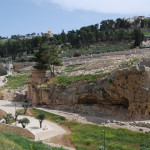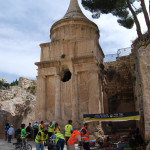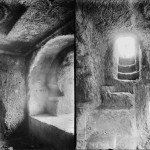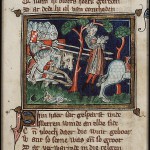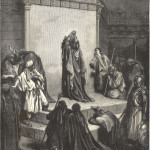Jerusalem. Tombs of the Kidron Valley. Part one
In Jerusalem, at the foot of the Mount of Olives, a free standing ancient construction known as the Tomb of Absalom rises lonely over the valley of Kidron. The front face of the tomb is set outwardly in the direction of the Temple Mount, while the other three sides are surrounded by a rock in which they are hewn. The construction consists of two parts. The tomb’s height is about fifteen meters. The lower part of the tomb is completely cut from the rock, while the upper one is built upon it with stone blocks. The lower part consists of a foundation up to one and a half meters high and with the length of one rib over seven meters, and of a stepped plinth supporting the walls of the tomb.
The walls of the tomb are decorated with the pilasters in Greek style – two of them on every side, square columns in the corners, adjoined by a quarter-cylindrical column on each side. The upper part of the tomb is built out of large stone blocks joined to one another. Above the square section, the edifice has a round cylinder shape. Over the cylinder part there is a dome in the shape of an elongated cone, on top of which a lotus flower cut from stone is set, hollow from the inside. In the south section of the edifice there is the entrance into the tomb leading to the burial chamber.
According to the legend, this construction is the tomb of Absalom, one of the sons of king David. Absalom was the third son of king David. Absalom was born in Jericho, his mother was Maachah, the daughter of Talmai, king of Geshur. Although Absalom is not a positive historic figure, still, the story of Absalom is quite informative.
Absalom was the fairest young man in Israel, “From the top of his head to the sole of his foot there was no blemish in him.” He was especially praised for his hair, “When he cut the hair of his head (and it was at the end of every year that he cut it, for it was heavy on him so he cut it), he weighed the hair of his head at 200 shekels by the king’s weight.” Absalom had a beautiful sister named Tamar, and their half-brother Amnon, David’s elder son, conceived a passion for her. Drawing in Tamar to himself by slight, Amnon violated her, after which he drove the disgraced girl away. Wretched Tamar found her refuge in the house of Absalom, where she lived ever since in solitude.
When David learned about it, he was very angry, but nevertheless he did not grieve Amnon’s spirit, because he loved him. Absalom hated his half-brother with great hatred and just waited for an opportunity to avenge her, but in the meantime he, “did not speak to Amnon either good or bad,” pretending that he swallowed up the offense. He had the chance presented to him two years later, during the feast of shearing the sheep. Absalom begged his father to allow Amnon to go with him to this feast, and when Amnon got drunk Absalom’s servants by the order of their master struck the guest dead. Fearing his father’s anger, Absalom ran to Geshur, to his grandfather king Tamai and remained there for three years.
David, who loved Absalom, began to miss his son over time, and Joab, commander and David’s nephew noticed it. He convinced the king to return Absalom to Jerusalem, and David made a decision, “He must go to his own house; he must not see my face.” For two years Absalom lived in the capital, but he had no access to the king’s palace. The disfavoured prince sent for Joab several times, but the latter “refused to come.” Having lost his patience, Absalom ordered his servants to burn a field of barley that belonged to Joab. This time indignant Joab immediately arrived to hear from Absalom the following speaking, “Why have I come from Geshur? I want to see the king’s face, and if I am guilty of anything, let him put me to death.” Joab told David Absalom’s words, and soon the father and son were reconciled – Absalom “came in and bowed down with his face to the ground before the king. And the king kissed Absalom.”
Ambitious Absalom was eager to take his father’s throne, for which he had to win the people’s favour. To a great extent his appearance helped him in this, because the women viewed him as a prince from a fairy tale, while the men – as the pride and hope of Israel. Early in the morning, Absalom stood at the city’s gates and drew to himself those who were going to the king’s judgement to convince them that it would be hard for them to find justice with David, but if he, Absalom, were elected the king, he would judge everyone according to justice. Anyone who would come to bow down to him, Absalom embraced and kissed. Thus, winning the popularity and sowing enmity against David, Absalom “stole the hearts of the people of Israel.”
When his father had reigned for forty years, Absalom accompanied by two hundred men went to Hebron under the pretext of making offerings to God to give thanks for his return from exile to Jerusalem. After he came to Hebron, he sent “secret messengers throughout the tribes of Israel,” and soon gathered a large army which announced him the king; after that he marched toward Jerusalem.
David learned of the turmoil too late and, being stricken with terror, he fled from the capital on foot, leaving ten concubines behind “to take care of the palace.” The king was followed by servants and guards, and six hundred faithful men who remained faithful to him under Ittai the Gittite. Jerusalem was also abandoned by priests Zadok and Abiathar who took the Ark of the covenant with them. But David did not remain at a loss for a long time, soon he recovered his composure and started to take action. First of all he told Zadok and Abiathar to bring the ark back to Jerusalem, and to remain in the capital also, and through their sons to inform him of what was happening in the royal palace. Then David sent his close friend and confidant Hushai the Arkite to Jerusalem, charging him to pretend to be a traitor, get Absalom’s trust and frustrate Ahithophel’s advice, who was Absalom’s counsellor, and also to inform David of the insurgents’ plans. And hastily David began to gather an army of his supporters, of whom there were still rather plenty in the country.
Upon entering Jerusalem, Absalom, following Ahithopel’s advice, slept with his father’s concubines, to convince his followers that there was no way for him to turn back, and so, to make them more resolute. Then Ahithophel suggested to the rebellious prince to give him, that is to Ahithophel, twelve thousand men so that he would immediately, on the same night set out in pursuit of David to attack the king, when he was yet weary and weak. “And then all the people with him will flee. I would strike down only the king and bring all the people back to you. The death of the man you seek will mean the return of all; all the people will be unharmed,” – Ahithophel persuaded Absalom. Absalom liked Ahithopel’s advice, but he decided to listen also to Hushai the Arkite, who by that time gained his confidence. Hushai right away realized all the danger of the actions suggested by Ahithophel for David and tried to reassure Absalom. He reminded Absalom that his father was an experienced man, among other things – experienced in a guerrilla war and under the circumstances “he will not spend the night with the troops,” instead, he would hide himself in some cave. And if the king is not captured in the first attack on David’s followers, the people would reckon this as Absalom’s defeat. “Then even the bravest soldier, whose heart is like the heart of a lion, will melt with fear, for all Israel knows that your father is a fighter and that those with him are brave,” – cunning Hushai cautioned Absalom and suggested not to take chances, but march against David only when a huge advantage in numbers would be achieved, “Let all Israel, from Dan to Beersheba—as numerous as the sand on the seashore—be gathered to you, with you yourself leading them into battle. Then we will attack him wherever he may be found, and we will fall on him as dew settles on the ground. Neither he nor any of his men will be left alive. If he withdraws into a city, then all Israel will bring ropes to that city, and we will drag it down to the valley until not so much as a pebble is left.” The cunning eloquence of Hushai the Archite convinced Absalom, and David had a break he needed so desperately to gather his supporters and organize an army.
Before the decisive battle, David commanded his army leaders Joab, Abishai, and Ittai not to kill his rebellious son but to spare his life, “And all the troops heard the king giving orders concerning Absalom to each of the commanders.” The battle took place in the forest of Ephraim close to the Jordan and resulted in the uttermost defeat of the insurgents, who lost twenty thousand men killed. Absalom, trying to save his life by fleeing, carelessly rode under the thick branches of a large oak tree and got his famous hair entangled in them; “He was left hanging in midair, while the mule he was riding kept on going.” It was reported to Joab, who, despite the king’s order, “took three javelins in his hand and plunged them into Absalom’s heart.” Joab’s armour-bearers finished killing Absalom who was still showing signs of life, after which “they took Absalom, threw him into a big pit in the forest and piled up a large heap of rocks over him.”
Absalom had three sons and one daughter named Tamar; she was a beautiful woman and became a wife of Rehoboam, Solomon’s son, and gave birth to his son Abijah. At the same time, Absalom still in his lifetime set a monument for himself in the Kings’ valley; because he said, “I have no son to preserve my name.” Apparently, Absalom’s sons died well before their father. Apart from that, Absalom’s daughter named Maacah is also mentioned as Abijah’s mother and Rehoboam’s wife; and the mother of Asa, Abijah’s son, was Absalom’s daughter named Ana or Maacah.
In this article the materials were used from the book by A. P. Kondrashov “Who is Who in the Bible: Popular Encyclopaedic Dictionary,” Moscow. RIPOLL classics, 2004.

